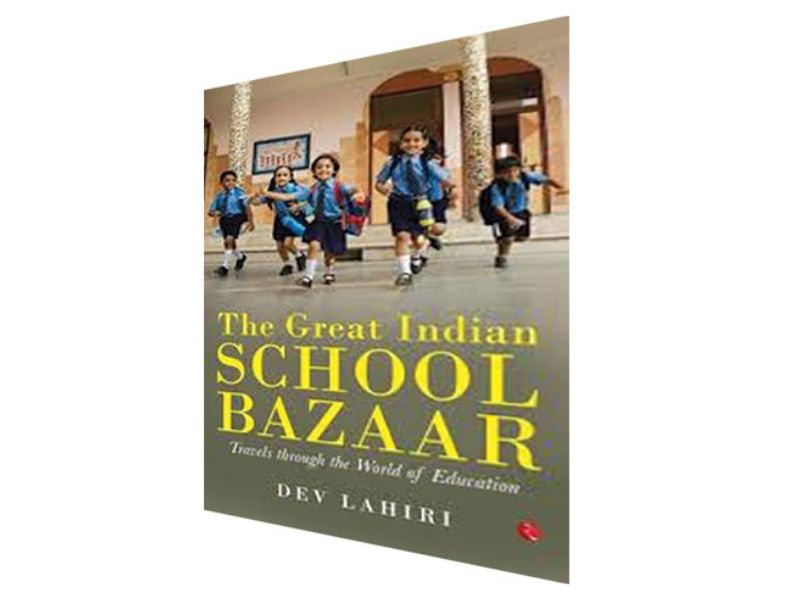The Great Indian School Bazaar, Dev Lahiri, Rupa publications; Rs.195, Pages 147
 This slim book – The Great Indian School Bazaar, authored by the late Dev Lahiri (1951-2018) is an easy read on the complex and multi-layered topic of school education in India. The author draws from his vast experience of over four decades as principal and educator of several of India’s top-ranked private schools including Lawrence, Lovedale and Welham Boys, Dehradun, and Wasatch Academy, USA to provide readers real, and often funny anecdotes. His sense of humour and joie de vivre manifest themselves in several parts of the book.
This slim book – The Great Indian School Bazaar, authored by the late Dev Lahiri (1951-2018) is an easy read on the complex and multi-layered topic of school education in India. The author draws from his vast experience of over four decades as principal and educator of several of India’s top-ranked private schools including Lawrence, Lovedale and Welham Boys, Dehradun, and Wasatch Academy, USA to provide readers real, and often funny anecdotes. His sense of humour and joie de vivre manifest themselves in several parts of the book.
The author of The Great Indian School Bazaar says that the purpose of schooling is varied. Some parents look at schooling as a status symbol and send their wards to so-called best schools, others want their children to follow in their footsteps. For the common man, sending his child to an English medium school is of utmost importance, irrespective of the quality, and the expectation is that this will automatically lead to a college degree and well-paid job. In either scenario, rarely is the child’s interests or aptitude given much weightage.
On the other hand, Lahiri is of the firm belief that one of the fundamental purposes of education should be to create good human beings who will make the world a better and happier place. In this connection, the onus of educating the heart and the soul, in addition to educating the mind, falls on the management and teachers of the schools.
They should ensure that students imbibe the values of compassion, sharing and caring, empathy and gender sensitivity, and this can happen only if the principal and teachers are role models who “walk the talk”. Teachers must practice what they preach and lead by example. And if they positively impact the life of a single student, it is likely to have a multiplier effect. The author also lays emphasis on the role of the schools leaders and says that unless the principal and management share a common vision, which is in sync with the expectations of parents, managing a school can become an arduous task.
The Great Indian School Bazaar also touches upon topics such as bullying and ragging, the advantages and drawbacks of day versus boarding school and the importance of sports and games education for teaching team-building and life skills.
The author puts forward an interesting suggestion of staging the school-leaving exam after class XI and using class XII as a preparatory year for college. This year should be spent consolidating the basic understanding and interconnectedness of all subjects and honing the skills of students for self-study, critical thinking, problem solving and other essential life skills.
In a chapter of The Great Indian School Bazaar – ‘Where are we heading?’ Lahiri talks about the need for comprehensive education reforms to mend the current system. In this highly readable book, he frankly admits that teaching isn’t the first-choice profession of most teachers because it’s an under-paid vocation. He proposes a merit-based service for teachers on the lines of the civil services. The attitude of our society towards the teaching profession needs to change and remuneration should also increase significantly, says Lahiri.
Briefly touching upon the Right of Children to Free & Compulsory Education (RTE) Act, 2009, the author stresses that 25 percent of students admitted into private schools under s.12 (1) (c) must be from within the poorest strata of society. He criticises s. 12 (2) which stipulates that state governments are obliged to reimburse part of their fees to school managements on the ground that it is never anywhere near the per student expenditure of top-ranked schools, and even these low amounts are never reimbursed on time. This imposes heavy monetary pressure on schools that comply with this provision of the RTE Act and often adversely affects teachers salaries.
Citing an essay by columnist and social commentator Gurcharan Das, the author suggests that it might be a good idea to open up government schools to privatisation and give them full freedom to affiliate with any exam board as well as the freedom of deciding the fee structure, admission criteria among other details. All of this could be shared in a completely transparent manner so that parents would have all the information they need before they select a school for their child. This would lead to healthy competition among all private schools and may also result in affordable fees, argues Lahiri.
Since teachers are the bedrock of the entire education system, they should have professional pride, foster creativity and open up opportunities for their students. Rote learning should be discouraged and parents should stop being obsessed with prestigious professional courses. They should, instead, get to know their child better to build warm, trusting relationships, he advises.
As mentioned in the preface, The Great Indian School Bazaar does not claim to be a comprehensive study of the Indian education system. It does not cover the deeper implications and ramifications of the RTE Act, nor does it talk about the teaching-learning process in government schools.
Having been a teacher myself, I am in total agreement with the opinions expressed in the book and I am sure it will definitely strike a chord with educators and parents alike.
Asha Sharma (The Book Review, June)























